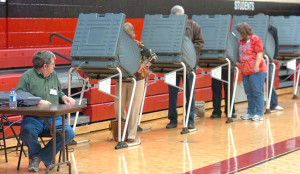Village looks to remove polling places from schools

By Adam Tobias | Wisconsin Reporter
GREENDALE, Wis. — School buildings in the village of Greendale seem to be safe enough for the hundreds of children who use them every day.
DON’T VOTE HERE: The village of Greendale is considering removing polling places from elementary schools, a move some say could cause voter disenfranchisement.
But apparently not on election days, when law-abiding citizens lurk in the halls, looking to cast a ballot.
At the urging of the village’s School Board and other school administrators, the Greendale Board of Trustees has agreed to place a nonbinding referendum on the November ballot asking residents whether polling places should be removed from elementary schools — a move, which, some say, could lead to voter disenfranchisement.
The Milwaukee suburb joins numerous municipalities and school boards across the country in considering the election day change after the December 2012 shooting at Sandy Hook Elementary School in Newton, Conn.
But Newton has not taken any of its polling places out of schools since the deadly rampage almost two years ago, Registrar of Voters Karin Aurelia told Wisconsin Reporter.
“It didn’t seem to be a priority,” Aurelia said.
Wisconsin also doesn’t appear to be following other states in looking to eliminate polling places in schools.
Close to 700 of the 6,567 wards in the state had polling places in school buildings in the 2012 presidential election, and that number is relatively the same for the 2014 November election, according to data obtained from the Wisconsin Government Accountability Board.
The bipartisan Presidential Commission on Election Administration released a report earlier this year recommending polling places be located in schools because “they have the needed and desirable space, are inexpensive, widespread, conveniently located, and accessible for people with disabilities.”
About 25 percent of voters nationwide cast a ballot in schools in the 2008 and 2012 elections, according to the commission’s report.
“In the end, there is no better alternative than schools, and there are few locations more familiar and convenient to voters,” the report says.
But Greendale Schools Superintendent John Tharp and the school board are not backing down, largely because of concerns raised by principals and parents over the years.
Almost 50 percent of Greendale guardians support the proposed removal of polling places from schools; 20 percent believe no change is needed, according to a survey conducted by the Greendale School District.
Tharp and all five school board members did not return phone calls from Wisconsin Reporter seeking comment, but Tharp and Joseph Crapitto, president of the board, issued a joint statement by email explaining their rationale for the proposal.
“Safety is a huge concern for us every day,” the statement says. “Gun violence is only part of it. Vandalism, theft, non-custodial parents or individuals with restraining orders entering the building are others.”
A May 20 letter from the school board to village trustees claims that, despite hundreds of thousands of dollars being spent on school safety enhancements over the past five years, the safety measures are largely ineffective on election days.
The letter also indicates physical education classes and lunch periods can be disrupted by election activities and that voters are a distraction to classrooms.
“We have considered the option of scheduling our calendar around election days, but have determined that based on school needs adjusting the school schedule is not realistic,” according to the school board’s letter.
But Greendale Clerk and Treasurer Kathryn Kasza says in a May 6 memo that village staff has looked at other public facilities to use as polling places, but each one is already being used or has accessibility issues that do not meet state or federal requirements.
To help improve safety, the village has added an auxiliary police officer and an election greeter to the entrances at the three publicly funded elementary schools on election days, according to Kasza.
Because of the added security measures, Estelle H. Rogers, legislative director of the nonpartisan Project Vote, questions if child and voter safety is the true motive behind the proposal.
Rogers says polling places have been in schools for decades, and she’s not aware of any major incidents on election days that would necessitate such a change.
“It feels like a pretext to me,” Rogers told Wisconsin Reporter.
Rogers also said shootings can occur anywhere and that moving the polling places would just be shifting the “risk.”
“You could say that about church basements” she added. “They don’t have the greatest security, and they’re used as polling places all the time.”
Both Rogers and Kasza think that constantly switching up polling places could cause voter disenfranchisement.
“Any time you change polling places that have been in place for a long time, you are going to have some voter confusion and probably some people disenfranchised because they were headed in one direction and they had 25 minutes to get it done before going to work, and they were directed to another direction,” Rogers said.







